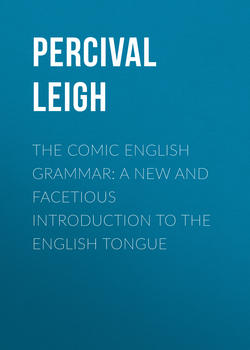Читать книгу The Comic English Grammar: A New And Facetious Introduction To The English Tongue - Leigh Percival - Страница 4
PART II. ETYMOLOGY
CHAPTER II. OF THE ARTICLES
ОглавлениеThe Articles in English are two, a and the; a becomes an before a vowel, and before an h which is not sounded: as, an exquisite, an hour-glass. But if the h be pronounced, the a only is used: as, a homicide, a homoepathist, a hum.
A or an is called the indefinite article, because it is used, in a vague sense, to point out some one thing belonging to a certain kind, but in other respects indeterminate; as,
"A horse, a horse, my kingdom for a horse!"
So say grammarians. Eating-house keepers tell a different story. A cheese, in common discourse, means an object of a certain shape, size, weight, and so on, entire and perfect; so that to call half a cheese a cheese, would constitute a flaw in an indictment against a thief who had stolen one. But a waiter will term a fraction, or a modicum of cheese, a cheese; a plate-full of pudding, a pudding; and a stick of celery, a salary. Here we are reminded of the famous exclamation of one of these gentry: – "Sir! there's two teas and a brandy-and-water just sloped without paying!" The is termed the definite article, inasmuch as it denotes what particular thing or things are meant as,
"The miller he stole corn,
The weaver he stole yarn,
And the little tailor he stole broad-cloth
To keep the three rogues warm."
A substantive to which no article is prefixed is taken in a general sense; as, "Applesauce is proper for goose that is, for all geese.
A few additional remarks may advantageously be made with respect to the articles. The mere substitution of the definite for the indefinite article is capable of changing entirely the meaning of a sentence. "That is a ticket" is the assertion of a certain fact; but "That is the ticket!" means something which is quite different.
The article is not prefixed to a proper name; as, Stubbs, Wiggins, Brown or Hobson, except for the sake of distinguishing a particular family, or description of persons; as, He is a Burke; that is, one of the Burkes, or a person resembling Burke.
The definite article is frequently used with adverbs in the comparative and superlative degree: as, "The longer I live, the taller, I grow or, as we have all heard the showman say, "This here, gentlemen and ladies, is the vonderful heagle of the sun; the 'otterer it grows, the higherer he flies!"
